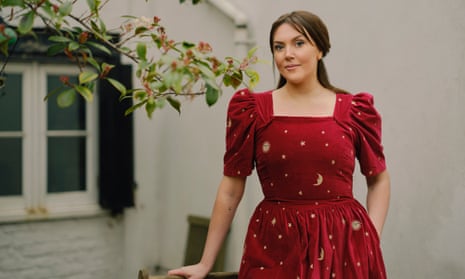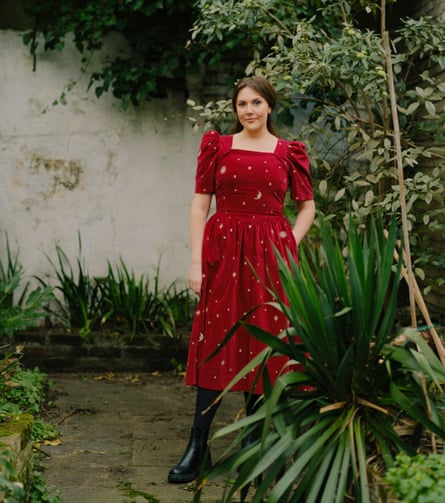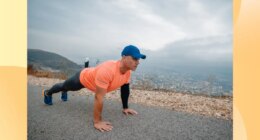
‘My dad wanted to be James Bond. He nearly killed us both’: actor and writer Katy Wix
Katy Wix had a difficult relationship with her dad. But after a near-fatal car accident, they found themselves growing closer
Good dads are all alike, but every shit dad is shit in his own way.
When I was little, I used to worry that my dad loved James Bond more than he loved me. When Bond films were on, he would shush me when I asked if we could watch The Simpsons. He was a tall man, jammed with sadness and mystery. He worked late in a job he didn’t like and slept in the day. His dream was to have been an actor or an artist, but these weren’t practical choices for a man from a small Welsh town who left school young. I would catch him crying at the news, or singing songs from musicals when he did the washing up and didn’t know we could hear him, but apart from that he was remote. Other friends’ dads had a comfortable, confident ease where they would loudly give an opinion and everyone had to fake agree. I longed for mine to have some of that, whatever it was. My dad was only really relaxed when he was holding a drink in his hand and could be left alone to watch another man drive a fast car – and wish it was him. He was frightened by anything that challenged him. He went his whole life without trying hummus.
Sometimes I would stay and watch the Bond film, just to be in the same room as him. But it made being a woman look awful. This glimpse of my future life – where the women were there to move the plot along or be aggressively kissed until they stopped wriggling – frightened me. I remember thinking, “When I grow up, I’ll never have blonde hair or drive a car or be a woman at all. I’ll find a way out and I’ll always be in charge of the TV remote.” The first thing to do was never to get hips. So I started skipping meals.
The morning it happened, my dad and I argued. I was 25 and hungover. He kept saying, “We’re running late,” as we set off for the train station. We bickered about what music to play (me the White Stripes, him silence). “You’re looking very thin,” he said. The baggy purple shirt I had started wearing wasn’t enough to hide how little I was eating. He turned off the White Stripes. “Can you not comment on my body please?” I snapped. “You’re nearly as thin as your mother,” he said. He looked over at me, I looked out of the window – and it happened.
There was a horrific bang of metal on metal from the right side of the car. Something had hit us at great speed. The violence of the impact sent my body forward and up, and then we were spinning and spinning. My body was forced in the opposite direction, down and back, into the curve of the car seat, as we turned uncontrollably and I was held in place with great force. The pressure of the seat belt cut and scraped into my collarbone and upper stomach, and my head was pinned into the headrest at a weird angle, with my mouth half-open. It was an effort to make a noise, but I did. I heard myself scream, “Oh God, no, no, no,” over the crunching burst of brakes and the shrill squeaking of tyres. I wondered if we were upside down or not. I only knew that we were moving through the air, without warning, as if I had been walking along, minding my own business, and then suddenly placed mid-loop on Oblivion at Alton Towers.

Somehow, the spinning got quicker. My hands gripped the rough-cushioned material of the seat on either side of my thighs and my teeth slammed together. The baggy purple shirt billowed as if it was moving separately from the rest of me. I thought of what we must look like from the outside, a car moving through the air. Any witnesses must be thinking, “I’m glad that’s not me in that car.” I wondered when the spinning would end, and I wished I could ask the people watching if I was going to live. Then we hit something else and there was another bang. My head jolted forward as if I’d headbutted the air or done a huge sneeze. My dad never made a noise.
Then everything was quiet and still, except the white powder from the air bags hovering above the dashboard, and an immense heat in my chest. We had come to a stop in the middle of a dual carriageway. “I’m dead,” was my first thought. “I’ve died at 25. I had such potential and now I’m dead. I’ll never go on a panel show and I’ll never fall in love. I’ve died.” I looked down at my body. There was no blood, but I could taste some in my mouth. I looked over at my dad. He was slumped in his seat, not moving, eyes closed. I’d remembered from watching Casualty that you should repeat the person’s first name to keep them conscious. So rather than use “Dad”, I began to yell his name to try and wake him. When the paramedics arrived, on hearing this, they asked if he was my partner and then I died for real, of embarrassment.
I didn’t feel the pain until I was in hospital. The tears fell down my cheeks and on to the pillow, making it wet, because I couldn’t wipe them away. A nurse massaged my hand open because my fingers were still so tense from where they had gripped the seat. My shoulder, collarbone and sternum were all broken from the force of the seatbelt. I imagined this line as a perfect crack through my body, like the crease down the spine of a book, or the line of fate on a palm. A bruise formed in the next few weeks, like a dark purple sash. The seatbelt had saved me – and broken me.
READ RELATED: I have an irrational and extreme fear of my grandson dying | Ask Philippa
My father was in a different room. He had fractured his skull. As I fell asleep, I remembered he was looking at me just before it happened and I wondered why he hadn’t been looking at the road. I wished we hadn’t been arguing and I wished he didn’t love driving like he was in a film. And I thought about all the times I felt unsafe in cars with men and didn’t speak up, and why it took me so long to notice my own emotional terror, let alone find the right words to express it. I thought about the boys in school who drove too fast and how we got in the car with them just to be close to them. Girls would come in on crutches because they had older boyfriends who drove recklessly. And all we would think was, “Wow, she has a boyfriend.” And our skin would flush with the excitement of the future as we signed our names on their cream casts.
The next few months passed by in a haze of opioids in a box room in my parents’ small Welsh cottage. I had forgotten my MySpace password so at least I didn’t have to see photos of friends getting on with their lives. I was meant to be travelling up to London to see Wicked and a Sarah Kane play. At meal times, I would be lifted up to an angle high enough to eat soup and then lowered carefully back down. My hair grew long, as if I was putting down roots. My periods stopped, as if my body was conserving energy and knew it wasn’t the time to have a baby. There was nothing else to do but masturbate at half speed, nap, and dwell on the past. I read all of His Dark Materials and hallucinated polar bears in the mornings. It was a long lonely time, incubated in my own imagination.
Dad’s bedroom was next to mine and Radio 4 came through the walls at night. The police had said the crash was just an accident, just an unlucky blind spot. It was no one’s “fault”. But when I heard The Now Show floating from his room into mine, I was angry that he had forced me to put my life on hold and nearly killed us both. I thought about how we had argued just before it happened, and how he should have realised it’s not good to drive on an argument, and how I should have said that I felt a sense of doom in my stomach just before.
When Mum went out to work, she would leave crisps and sandwiches for us. My dad and I would meet in the kitchen once we were both able to stand. We would politely ask each other which flavour crisp the other preferred, or report something funny the dog had done. After a few weeks, we began going on small walks down the road. When we reached the house with the stone toads, he was out of breath and had to lean on a telegraph pole. “I’m sorry,” he kept saying. But I wasn’t sure if he meant sorry about not being able to walk any further, or sorry for driving the car that day. We talked about how to not get piles when you’re on strong painkillers. And whenever I laughed, my broken sternum filled with pain and he would wince, as if the pain was his, too. We began to talk about what happened. He couldn’t remember anything about the crash and I remembered everything. He told me about who his favourite artists were when he was in his 20s, and how he was worried his mind wasn’t as good since the crash and that he couldn’t remember much about his father any more, who died when he was young. I told him about how difficult I had found life since university. He told me how insecure he was at having left school early without many qualifications. On the final walk, he asked for my forgiveness.
He started painting again. He never drove after that or watched Bond films. They now had nothing to offer him. They never showed the consequences of driving like a dickhead. I don’t remember the bits in James Bond films when he injures his daughter, or has to have a nurse to help pull his pants up, or receives a Get Well Soon card from NatWest.
When I moved to London, Dad sent me postcards. Sometimes it would be of Brecon on a sunny day, sometimes it would be a little sketch he had done of a castle. On the back, in his scribbly, unconfident handwriting, he would say something funny that the dog had done, or tell me he was proud of me. By the time he died, my anger towards him had gone.
Recently, an older man kindly offered to give me a lift home after a work do. He was coming to the end of a loud anecdote about the cocktail book he got for Christmas. But I wasn’t listening because he was driving so fast. I was flooded with adrenaline, in a post-traumatic trance of silence and compliance. But then I realised that the car could hurt me a lot more than his opinion of me. I thought of my dad. “Can you slow down please?” I interrupted. He went very quiet and still and looked at me with furious confusion in his eyes, as if it hadn’t occurred to him that women’s minds were real. We drove slowly and in silence for the rest of the journey. I felt a warmth of relief in my chest, and I downed a mango smoothie without asking for his permission. I didn’t want the car to be a metaphor, I just wanted it to be something that got me home.
Katy Wix’s memoir, Delicacy, is published by Headline. Buy it for £9.29 at guardianbookshop.com
Source: Health & wellbeing | The Guardian









